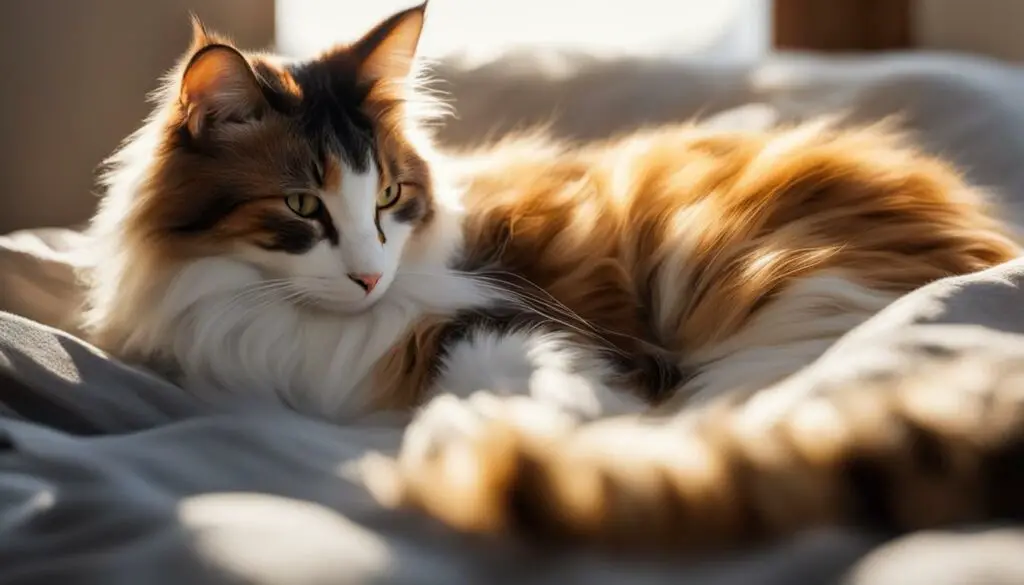I’ve often wondered why my cat, Mr. Whiskers, chooses to curl up on my bed when I’m not around. It’s a common feline behavior that many cat owners can relate to. In this article, we will delve into the reasons behind this curious habit and explore the fascinating world of cat psychology and behavior.
As a cat owner, I’ve come to understand that cats are complex creatures with their own set of emotions and instincts. Their behavior, even when we’re not around, is often a reflection of their inner world and their deep attachment to us as their owners. Let’s dive into the various reasons why cats sleep on our beds in our absence.
Key Takeaways:
- Cats may sleep on their owners’ beds when they’re away to seek warmth, safety, and familiarity.
- This behavior can be attributed to their natural instincts and their emotional attachment to their owners.
- Allowing your cat to sleep on your bed when you’re away can provide them with stress relief and strengthen your bond.
- However, there are reasons why you might not want your cat to sleep on your bed, such as allergies or sleep disruption.
- Strategies to discourage your cat from sleeping on your bed include providing alternative sleeping options and using deterrents.
Reasons Cats Sleep on Beds When Owners Are Away
When cats sleep on their owners’ beds while they are away, it can be attributed to several reasons:
- Sepaation anxiety: Cats may experience separation anxiety when their owners are not around. Sleeping on the bed provides them with a sense of comfort and solace.
- Scent marking: Cats have a strong sense of smell and may sleep on the bed to mark their territory and establish their presence in the absence of their owner.
- Seeking solace and protection: The bed offers a safe and familiar environment for cats, providing them with a sense of security and protection when their owner is not present.
- Animal instinct: Sleeping on the bed is a natural behavior for cats. It allows them to maintain their routine and follow their instincts for relaxation and rest.
- Emotional bonding: Cats form strong emotional bonds with their owners. Sleeping on the bed helps them feel closer to their owner and provides a sense of companionship and reassurance.
“Cats may experience separation anxiety when their owners are not around. Sleeping on the bed provides them with a sense of comfort and solace.”
Understanding these reasons can help cat owners better respond to their feline companion’s needs and create a harmonious living environment for both parties.
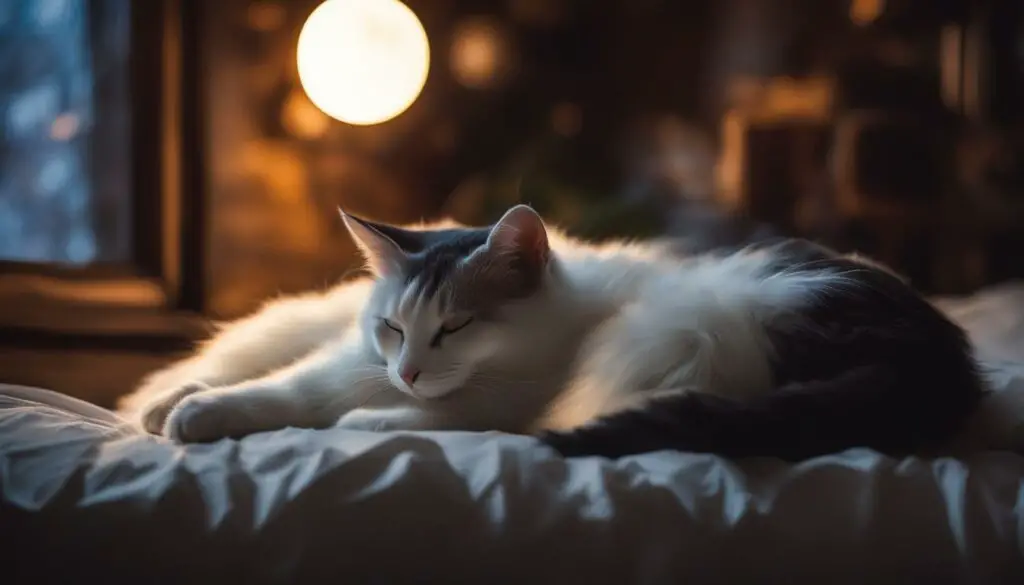
Table: Comparing the Reasons Cats Sleep on Beds When Owners Are Away
| Reasons | Description |
|---|---|
| Sepaation anxiety | Cats seek comfort and solace when their owners are away. |
| Scent marking | Cats use their scent to mark their territory on the bed. |
| Seeking solace and protection | The bed provides a safe and familiar environment for cats. |
| Animal instinct | Sleeping on the bed is a natural behavior for cats. |
| Emotional bonding | Cats feel closer to their owners and seek companionship on the bed. |
Cats Seek Safety on Beds
Cats may choose to sleep on their owners’ beds when they are away because it provides them with a sense of safety and security. Cats are naturally cautious animals and are constantly aware of their surroundings, making them vulnerable to potential threats. Sleeping on the bed, which carries their owner’s scent and provides a familiar environment, helps them feel safer and more protected.
Cats have a unique sleep pattern, known as light sleep, where they can quickly awaken if they sense any danger. By sleeping on the bed, they can stay alert and ready to defend themselves if needed. This behavior is often a result of their instinct to seek out high ground for safety, and the elevated position of the bed allows them to have a better view of their surroundings.
Cats are creatures of habit and routine, and sleeping on their owner’s bed may become a comforting and familiar part of their daily routine. The bed represents a place where they feel secure and can relax without any disturbances. It also provides them with the warmth and comfort they need for a good night’s sleep.

“The bed provides cats with a sense of safety and security due to the familiar scent and environment it holds,” says Dr. Jane Williams, a feline behavior specialist. “It’s their way of seeking comfort and reassurance in their owner’s absence.”
Cats Seek Warmth on Beds
Cats are known for their love of warmth and coziness. It’s no surprise that they often seek out comfortable spots in the house to nap, and one popular choice is their owner’s bed. When cats are left alone, they may gravitate towards the bed to find warmth and relaxation.
Cats have a normal body temperature that is slightly higher than humans, around 100-102 degrees Fahrenheit. This means that they are naturally drawn to warm spots to maintain their body temperature and stay comfortable. Sleeping on their owner’s bed can provide them with the warmth they crave, especially if the bed is located near a radiator or in a sunny spot where the sunlight can provide additional heat.
This behavior is perfectly natural for cats, as they have evolved to seek out warm spots in their environment. In the wild, cats would find warmth by curling up in a sunny spot or next to a warm rock. Sleeping on their owner’s bed is an extension of this natural behavior, as it provides them with a cozy and warm place to rest.
So, if you find your cat sleeping on your bed when you’re away, it’s likely because they are seeking out the warmth and comfort that it provides. Understanding this behavior can help you better accommodate your cat’s needs and create a harmonious living environment for both of you.
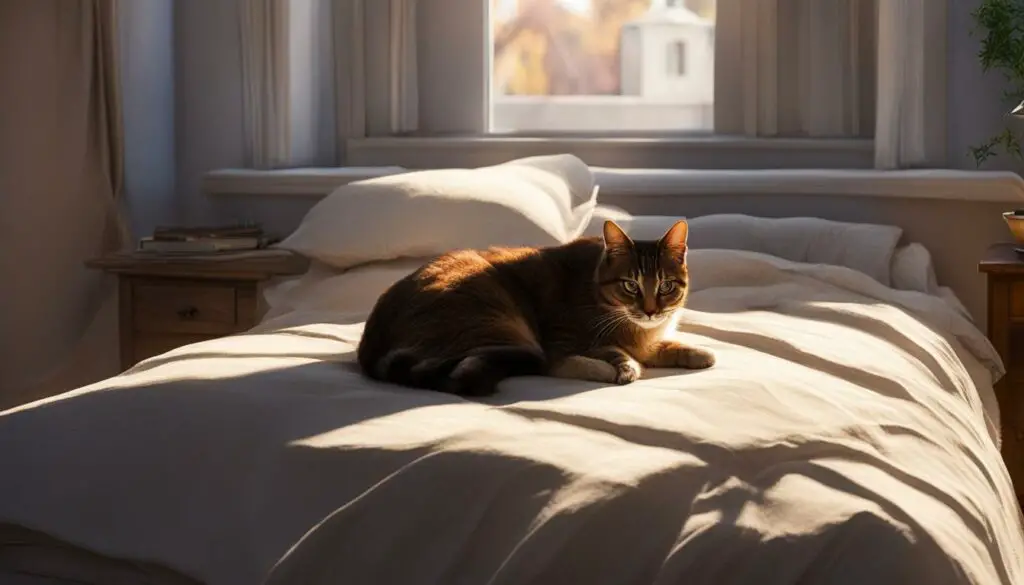
Cats Miss Their Owners on Beds
Cats form an emotional connection with their owners, and their sleeping habits can reflect this bond. When cats sleep on their owners’ beds when they’re away, it is often because they miss their owners and seek companionship and familiarity. This behavior, known as pillow behavior, is a way for cats to find comfort in their owner’s absence and surround themselves with familiar smells.
Cats are highly scent-oriented creatures and rely on their sense of smell to navigate and understand their environment. When they sleep on their owners’ beds, they are surrounded by the scent of their loved ones, which provides them with a sense of security and reassurance. The familiar smells help cats feel connected to their owners, even when they are physically apart.
In addition to seeking emotional connection, cats may also sleep on their owners’ beds for the warmth and comfort it provides. Sleeping on a soft, cozy bed can offer a sense of relaxation and relaxation for cats. The warmth of the bed, especially when combined with the scent of their owner, creates a soothing environment that promotes relaxation and sleep.
It’s important to note that cats have individual preferences and may not always choose to sleep on their owners’ beds. Some cats may prefer their own designated sleeping areas or cozy spots around the house. However, if your cat chooses to sleep on your bed when you’re away, it’s a sign of their attachment and longing for your presence.
“Cats seek comfort and companionship on their owners’ beds when they’re away. They miss their owners and find solace in the familiar smells and warmth of the bed.”
| Reasons Cats Sleep on Beds When Owners Are Away | How Cats Express Their Emotional Connection |
|---|---|
| Seeking emotional connection | Surrounding themselves with familiar smells |
| Longing for companionship | Finding comfort in their owner’s absence |
| Seeking warmth and relaxation | Creating a soothing environment with the scent of their owner |
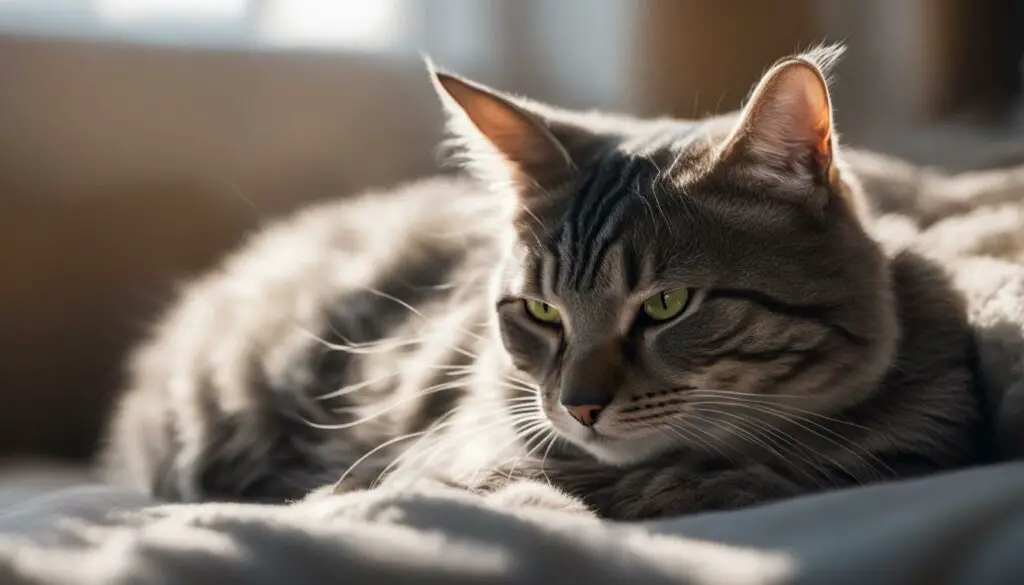
Cats Mark Their Territory on Beds
Cats have a strong instinct to mark their territory, and one way they accomplish this is by sleeping on their owners’ beds. By leaving their scent on the bed, they assert their ownership and establish their presence in the household. This territorial behavior provides cats with a sense of safety and security in a familiar environment.
When cats sleep on their owners’ beds, they leave behind their own scent, which acts as a form of communication to other animals. This scent marking signals to other cats and animals that the bed is occupied territory, deterring potential intruders and providing a sense of safety for the sleeping cat.
For cats, sleeping on their owners’ beds is not only about claiming territory but also about seeking a familiar and comfortable environment. Beds carry the scent of the owner, providing a reassuring presence even in their absence. This familiar scent helps alleviate any feelings of loneliness or insecurity, allowing the cat to relax and sleep more peacefully.
| Reasons Cats Mark Their Territory on Beds | Benefits for Cats |
|---|---|
| Claiming ownership | Sense of safety and security |
| Establishing presence in the household | Communication with other animals |
| Creating a familiar environment | Alleviating feelings of loneliness or insecurity |
In summary, cats mark their territory on beds as a way to assert ownership, communicate with other animals, and find comfort in a familiar environment. Understanding this behavior can help cat owners provide appropriate accommodations and ensure a harmonious living environment for both cats and humans.
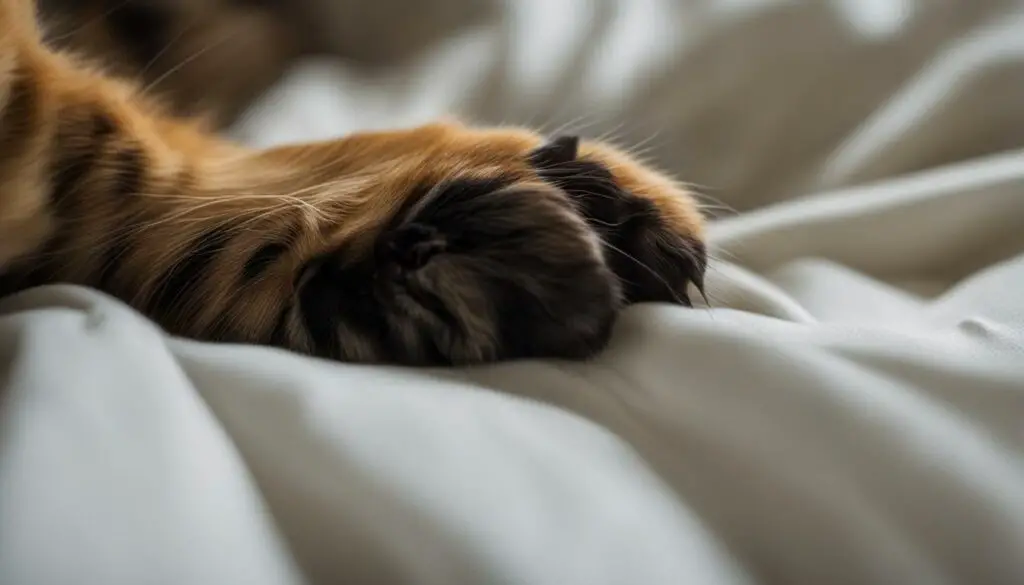
Should You Allow Your Cat to Sleep on Your Bed When You’re Away?
Allowing your cat to sleep on your bed when you’re away can have several benefits for both you and your furry friend. One of the main advantages is stress relief. Cats can experience separation anxiety when their owners are not around, and sleeping on your bed can provide them with a sense of comfort and security, helping to lower their cortisol levels.
Furthermore, allowing your cat to sleep on your bed can strengthen the bond between you. Cats are social animals and often seek companionship and closeness. Sharing your bed creates a familiar environment that can ease their anxiety in your absence and reinforce the bond between you.
Another reason to consider allowing your cat on your bed is the warmth it provides. Cats naturally seek out warm spots for their naps, and your bed can be a cozy and comfortable place for them to sleep. Plus, the familiar smells and textures of your bed can make them feel at ease and more relaxed.
Of course, whether or not you allow your cat on your bed is a personal preference. Some people may have allergies or concerns about cleanliness that make it impractical or undesirable. In such cases, you can try implementing strategies to discourage your cat from sleeping on your bed, such as providing alternative sleeping options like a cat bed or using scent deterrents.
| Reasons to Allow Your Cat to Sleep on Your Bed When You’re Away |
|---|
| Stress relief |
| Bond strengthening |
| Warmth and comfort |
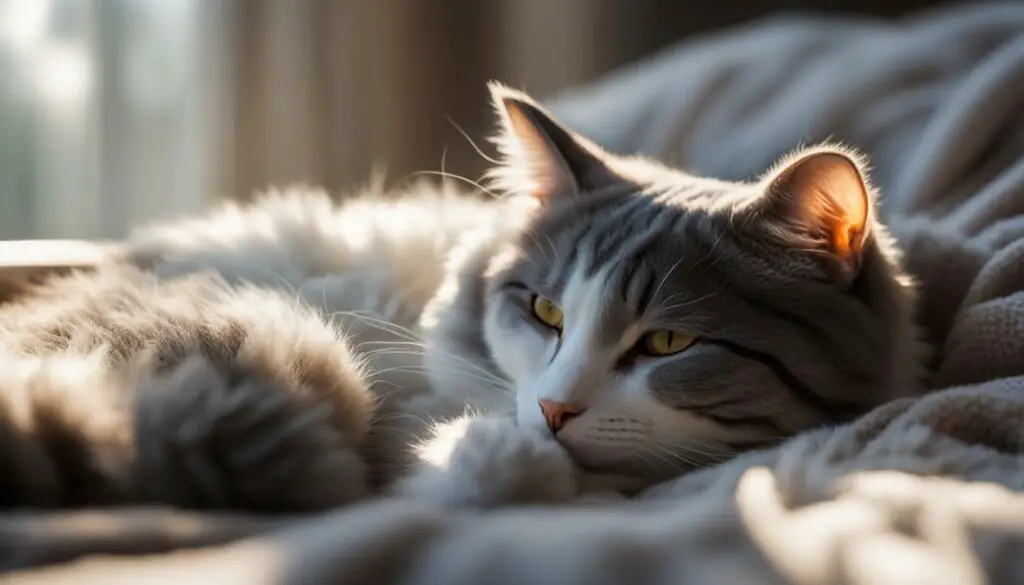
“Allowing your cat to sleep on your bed can provide them with a sense of comfort and security, helping to lower their cortisol levels.”
Ultimately, the decision to allow your cat on your bed when you’re away is a personal one. Consider your cat’s needs and your own preferences to determine what works best for both of you. Whether you choose to share your bed or not, ensuring that your cat feels safe and supported during your absence is essential for their well-being.
Reasons to Let Your Cat Sleep on Your Bed
If you’re wondering whether or not to allow your cat to sleep on your bed when you’re away, there are several reasons why it can be beneficial for both you and your feline companion. Let’s explore some of the key reasons to let your cat enjoy the comfort of your bed.
Stress Relief and Lower Cortisol Levels
Allowing your cat to sleep on your bed can provide them with a sense of security and help alleviate stress. Cats are known to release stress-reducing hormones when they are in familiar environments and surrounded by their favorite scents. By sharing your bed, your cat can experience a greater sense of relaxation and comfort, leading to lower cortisol levels.
Stronger Bond and Increased Bonding Time
Sleeping on the bed can also strengthen the bond between you and your cat. Cats are social animals and often seek companionship, even when their owners are away. Allowing them to sleep on your bed can create a deeper emotional connection and provide valuable bonding time, enhancing the trust and companionship that you share.
Warmth and Familiar Smells
Your bed provides a cozy and warm spot for your cat to curl up, especially during the colder months. Cats naturally seek out warm places for their naps, and your bed can fulfill this need. Additionally, sleeping on your bed allows your cat to surround themselves with familiar smells, such as your scent, which can offer a sense of security and reassurance.
So, if you’re comfortable with the idea and enjoy the company of your cat, letting them sleep on your bed can be a wonderful way to strengthen your bond, provide comfort, and create a soothing and familiar environment for your furry friend.
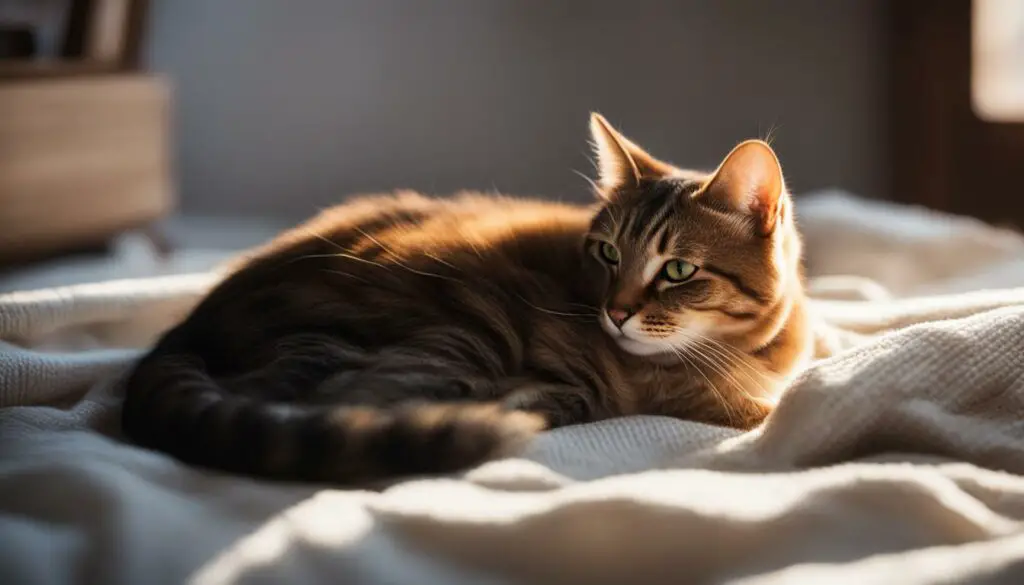
Reasons to Stop Your Cat Sleeping on Your Bed
If you have allergies, allowing your cat to sleep on your bed when you’re away can exacerbate your symptoms. Cat dander, saliva, and urine can trigger allergic reactions, leading to sneezing, itching, and respiratory discomfort.
Cleanliness is another factor to consider. Cats may bring dirt, hair, and even fleas onto your bed, which can compromise its hygiene. Additionally, if your cat has accidents or leaves behind urine or feces, it can be unpleasant to discover upon your return.
Sleep disruption is a common issue when cats sleep on their owners’ beds. They may move around, scratch, or knead during the night, disrupting your sleep and potentially affecting your overall well-being. If you value uninterrupted rest, discouraging your cat from sleeping on your bed might be a good choice.
Lastly, personal preference plays a significant role in this decision. Some people simply prefer to have their bed as a personal and private space, free from the presence of pets. It’s important to respect your own boundaries and create a sleeping environment that aligns with your preferences.
| Allergies | Cleanliness | Sleep Disruption | Personal Preference |
|---|---|---|---|
| If you have allergies, allowing your cat to sleep on your bed can worsen your symptoms. | Cats can bring dirt, hair, and potential pests onto your bed, compromising its cleanliness. | Cats may disrupt your sleep by moving around, scratching, or kneading during the night. | Personal preference plays a role in wanting to keep your bed pet-free for a private sleeping space. |
Strategies to Discourage Your Cat from Sleeping on Your Bed
While it can be comforting to have your cat sleep on your bed when you’re away, some owners prefer to keep their sleeping space cat-free. If you want to discourage your cat from sleeping on your bed, there are several strategies you can try:
Provide Alternative Sleeping Options
One effective way to redirect your cat’s sleeping habits is to provide alternative comfortable sleeping options. Consider getting a cat bed, cat tree, or cat sling that your cat will find cozy and inviting. Place these alternatives in areas where your cat likes to sleep, ensuring they are easily accessible and appealing to your feline friend.
Close the Bedroom Door
If you want to keep your cat out of your bedroom altogether, simply close the bedroom door when you’re away. This physical barrier will prevent them from accessing your bed and deter them from trying to sleep there. Be sure to provide alternative spaces with comfortable bedding in other areas of your home for your cat to enjoy their naptime.
Use Sticky Tape on the Bed
Cats dislike sticky surfaces, so using double-sided sticky tape on your bed can discourage them from jumping on it. Place the tape strategically across the bed, focusing on areas where your cat tends to lay. The sensation of the sticky tape on their paws will deter them from choosing the bed as their sleeping spot.
Utilize Scent Deterrents
Cats have a keen sense of smell, so using scent deterrents can discourage them from sleeping on your bed. Certain scents, like citrus or menthol, are unpleasant to cats and can make them avoid specific areas. You can apply these scents on your bed or use essential oils or sprays specifically designed to repel cats. However, always ensure that these scents are safe for your pet and consult with a veterinarian if you have any concerns.
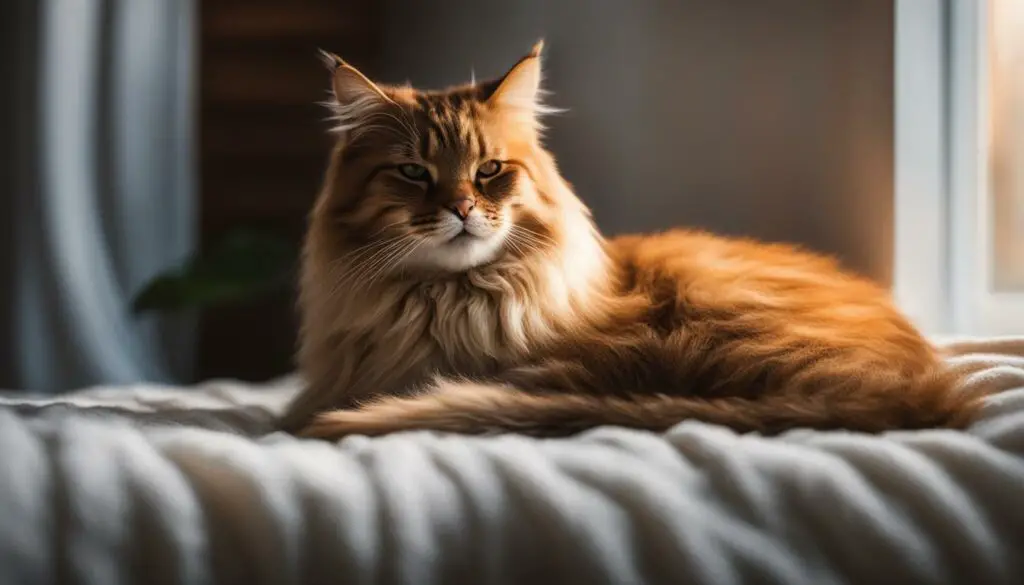
| Strategy | Description |
|---|---|
| Provide Alternative Sleeping Options | Offer comfortable alternatives like cat beds, cat trees, or cat slings. |
| Close the Bedroom Door | Physically block your cat’s access to your bed by closing the bedroom door. |
| Use Sticky Tape on the Bed | Apply double-sided sticky tape to deter your cat from jumping on the bed. |
| Utilize Scent Deterrents | Use scents like citrus or menthol to repel cats from your bed. |
Preparing Your Cat for Your Absence
Before you leave, it’s essential to take certain steps to ensure your cat’s well-being and comfort in your absence. By planning ahead and providing the necessary support, you can help your cat feel secure and reassured while you’re away.
Arranging for a Cat Sitter or Caregiver
If you’ll be gone for an extended period, consider finding a trustworthy cat sitter or caregiver who can provide daily care and attention. This person should be familiar with cats and their needs, ensuring your furry friend receives the love and care they require. Make sure to discuss your cat’s routine, dietary preferences, and any specific instructions with the sitter to maintain consistency and minimize stress.
Supplying Necessary Items
Stock up on essential supplies before your departure, ensuring your cat has everything they need. This includes an ample supply of food, fresh water, litter, and any medications your cat may require. Having these items readily available will help maintain your cat’s routine and prevent any disruptions.
Maintaining a Routine
Cats thrive on routine, so it’s important to keep their daily schedule as consistent as possible, even when you’re away. Leave instructions for the cat sitter or caregiver regarding feeding times, playtime, and other activities your cat is accustomed to. This will provide a sense of familiarity and security, reducing any anxiety your cat may experience in your absence.
Providing Comfort Items
Leave behind some of your cat’s favorite toys, blankets, or bedding that carries your scent. These familiar smells can help reassure your cat and provide a sense of comfort and familiarity. Additionally, consider leaving a piece of clothing or an item that smells like you, as this can further ease your cat’s separation anxiety.
| Planning Tips: | Cat Sitter: | Supplies: | Routine: | Comfort Items: |
|---|---|---|---|---|
| Find a reliable cat sitter or caregiver | Ensure they understand your cat’s routine and needs | Stock up on food, water, litter, and medications | Maintain your cat’s daily schedule | Leave familiar toys, blankets, and items with your scent |
| Discuss any specific instructions or preferences | Provide contact information in case of emergencies | Leave clear feeding and medication instructions | Include playtime and interactive activities | Consider leaving an item that smells like you |
| Ensure the sitter has access to your home | Inform them of any behavioral or medical concerns | Have enough supplies to last the duration of your absence | Keep litter boxes clean and accessible | Leave comforting scents and familiar items in their sleeping area |
By taking these steps to prepare your cat for your absence, you can help minimize their stress and promote a smooth transition. Remember, cats rely on routine and familiarity, so providing a stable environment and proper care will ensure their well-being while you’re away.
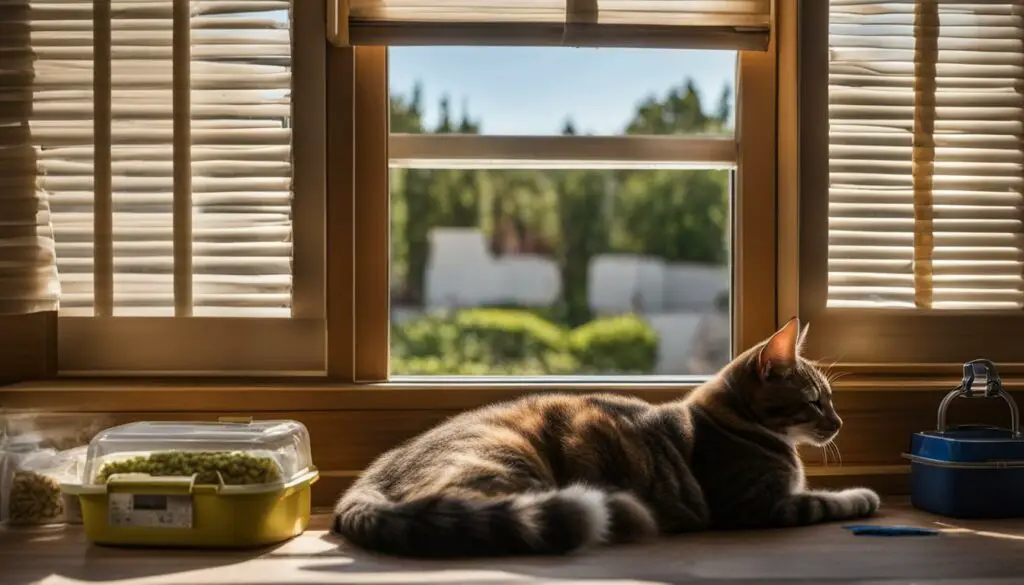
Helping Your Cat Adjust to Your Absence
When you’re away from home, it’s important to help your cat adjust to your absence to ensure their well-being and comfort. Here are some strategies to consider:
1. Maintaining Familiar Smells:
Cats rely heavily on their sense of smell, so leaving behind items that carry your scent can provide a sense of familiarity and reassurance. Consider leaving a piece of clothing or a blanket that has your scent on it, as this can help your cat feel more connected to you even when you’re not physically present.
2. Sticking to a Routine:
Cats thrive on routine and predictability, so it’s important to maintain their daily schedule as much as possible. This includes feeding times, play sessions, and any other activities that your cat is accustomed to. By sticking to a routine, you can help your cat feel more secure and provide them with a sense of stability during your absence.
3. Providing Comfort Items:
Make sure your cat has access to their favorite comfort items while you’re away. This could include their preferred bedding, toys, or even a cozy hiding spot. These familiar items can help reduce anxiety and provide a sense of security for your cat, making their time alone more tolerable.
4. Ensuring Social Interaction and Playtime:
Arrange for someone to spend time with your cat while you’re gone. This could be a trusted friend, family member, or a professional pet sitter. Regular social interaction and playtime can help keep your cat mentally and physically stimulated, reducing feelings of loneliness and boredom.
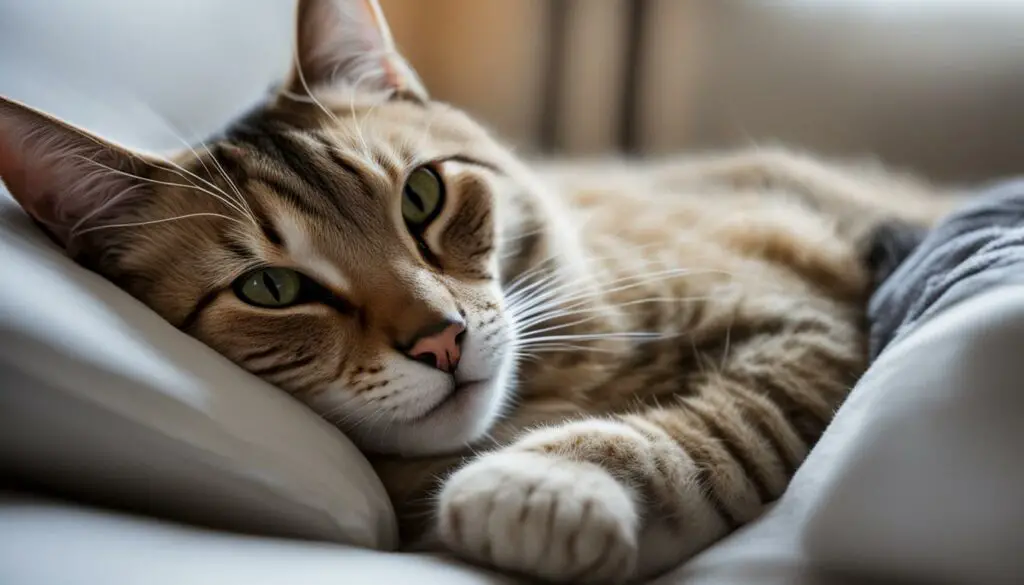
By implementing these strategies, you can help your cat adjust to your absence and minimize any stress or anxiety they may experience. Remember to consult with your veterinarian or a professional cat behaviorist for tailored advice to suit your cat’s individual needs.
Conclusion
After exploring the various reasons why cats sleep on their owners’ beds when they are away, it is clear that this behavior is driven by a combination of natural instincts and emotional attachment. Cats seek safety, warmth, familiarity, and comfort in their owners’ absence, finding reassurance in their presence through the familiar scent and environment.
Understanding these reasons allows us to respond better to our cats’ needs and create a harmonious living environment for both cat and owner. Allowing our cats to sleep on our beds when we’re away can help alleviate their separation anxiety and strengthen our bond with them. It provides them with warmth, comfort, and a familiar environment that eases their loneliness and provides a sense of security.
However, there are instances where allowing cats to sleep on our beds may not be ideal. Allergies, concerns about cleanliness, potential sleep disruption, and personal preference are valid reasons to deter cats from sleeping on our beds. Strategies such as providing alternative sleeping options, closing the bedroom door, using sticky tape on the bed, and using scent deterrents can help discourage this behavior.
Before leaving our cats alone, it’s important to make proper arrangements for their care, including finding a cat sitter or caregiver, providing necessary supplies, and maintaining their routine. Leaving familiar smells and comfort items can help them adjust to our absence, while ensuring social interaction and playtime with their caregiver can provide reassurance and alleviate anxiety.
FAQ
Why do cats sleep on their owners’ beds when they are away?
Cats may sleep on their owners’ beds when they are away for various reasons, including seeking warmth, safety, comfort, and familiarity. This behavior can be attributed to their natural instincts and their emotional attachment to their owners.
What are the reasons behind cats sleeping on their owners’ beds when they are away?
Cats may sleep on their owners’ beds when they are away to alleviate separation anxiety, mark their territory, seek solace and protection, follow their animal instinct, and maintain emotional bonding.
Why do cats feel safer sleeping on their owners’ beds when they are away?
Cats sleep more lightly than humans and are always ready to defend themselves, so sleeping on the bed, which carries their owner’s scent and provides a familiar environment, helps them feel safer.
Why do cats choose to sleep on their owners’ beds for warmth?
Cats are naturally attracted to warm spots for their naps, and their normal body temperature is relatively high. Sleeping on their owners’ beds can provide them with warmth and comfort, especially if the bed is located near a radiator or in a sunny spot.
Why do cats sleep on their owners’ beds when they are away?
Cats form emotional bonds with their owners and may sleep on their beds when they are away because they miss their owners and find comfort in their familiar smells. This behavior is often seen as a form of pillow behavior, where cats seek closeness and companionship during sleep.
Why do cats sleep on their owners’ beds to mark their territory?
Cats have a natural inclination to mark their territory, and sleeping on their owners’ beds is a way for them to claim ownership and establish their presence. By leaving their scent on the bed, they communicate to other animals that the bed is their territory, providing them with a sense of safety in a familiar environment.
Should I allow my cat to sleep on my bed when I’m away?
Allowing your cat to sleep on your bed when you’re away can help alleviate their stress by reducing cortisol levels. It can also strengthen your bond with your cat, provide warmth and comfort, and create a familiar environment that eases their anxiety in your absence.
What are the reasons to let my cat sleep on my bed when I’m away?
Allowing your cat to sleep on your bed when you’re away can help relieve their stress and lower cortisol levels. It provides them with warmth, strengthens the bond between you, and allows them to be surrounded by familiar smells that bring them comfort and reassurance.
Are there any reasons to stop my cat from sleeping on my bed?
There are some reasons why you might not want your cat to sleep on your bed when you’re away, such as allergies, concerns about cleanliness, potential sleep disruption, and personal preference.
How can I discourage my cat from sleeping on my bed when I’m away?
If you want to discourage your cat from sleeping on your bed when you’re away, you can try providing alternative sleeping options like a cat bed, cat tree, or cat sling. Closing the bedroom door, using sticky tape on the bed, and using scent deterrents like essential oils can also help deter your cat from sleeping on your bed.
What should I do to prepare my cat for my absence?
Before you leave, it’s important to make proper arrangements for your cat’s care. This includes finding a cat sitter or caregiver, providing necessary supplies, and maintaining your cat’s routine. You can also ensure their comfort by leaving their favorite bedding and toys accessible.
How can I help my cat adjust to my absence?
To help your cat adjust to your absence, you can leave familiar smells like clothing or blankets that carry your scent. Maintaining their routine, providing comfort items, and ensuring social interaction and playtime with their caregiver can also help ease their anxiety and provide reassurance.

